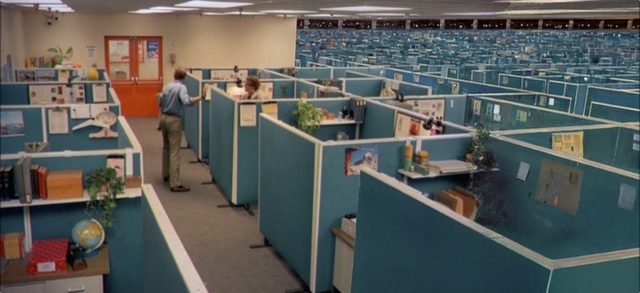
I felt unmoored and directionless after my high school job at Babbage’s dissolved at the end of 1997. I’d met my wonderful wife there—we’d go on to get married in 2003—but Babbage’s had been the only job I’d known. When the doors finally shut, I wasn’t sure what to do. I skipped the typical teenager process of wandering around the mall filling out dozens of applications for various stores—I’d gotten the job at Babbage’s merely by asking for it. Now I had no idea how to get another with nearly the same level of awesome.
For a while I slummed it at Electronics Boutique, since my Babbage’s experience was enough to get me hired with only a quick interview. It just wasn’t the same. This was long before both EB and Babbage’s were swallowed by the Gamestop monster, and although the merchandise was similar, the atmosphere was totally different. EB wasn’t anywhere near as fun as Babbage’s (probably because I was more used to slacking with friends than working), so I kept up the search for the perfect replacement job.
Back then, tech support seemed like a viable career option. Just a few years before, Microsoft had very famously hired armies of phone warriors to assist Windows 95 buyers with installing and working with the new operating system. Now Windows 98 had just launched a few months prior, and I had some relevant experience on the phones. Sometimes folks would call into Babbage’s or EB asking for help installing a program they’d bought, and I genuinely enjoyed helping them. It followed, I thought, that actually doing phone support as a job would be a great way to spend my time. I envisioned sitting back in a cubicle with my feet up on the desk, headset on my ear as I snappily answered question after question, earning the immense personal satisfaction one must feel when finishing up a workday filled from start to finish with the smiles and thanks of people you’d helped.
Those of you who’ve worked phones can start laughing at me now.
Courtship
A flyer in the hallway of the University of Houston TECH2 building seemed like the answer to my problems: a major computer manufacturer was looking for technically minded people, part-time or full, to do phone support. When class ended that day I put on a suit, drove from U of H’s main campus to the Metro building in downtown Houston, rode the elevator up to the twenty-fifth floor, and introduced myself to a receptionist in a beige fluorescent-lit lobby.
"CONVERGYS CORPORATION," read the sign on the wall. That didn’t sound like any computer OEM I’d ever heard of. If this were today, I would have pulled out my smartphone and Googled this prospective employer to see that they were, among other things, a supplier of call centers and outsourced labor for various consumer technology companies. However, this was the fall of 1998 and smartphones were still a ways off. I took an application from the tray on the receptionist’s desk and busied myself with filling it out, rehearsing bits of tech trivia in my head so that I’d have them ready at hand if needed. COM1 and COM3 are on port 0x3F8 and use IRQ4, I whispered to myself. COM2 and COM4 are on 0x2F8 and use IRQ3.
A few minutes later, a gentleman dressed in the immortal and unchanging tech uniform of khakis and a branded polo shirt led me through a pair of security doors and past rows and rows of filled cubicles into a cramped conference room with a window that showed more cubicles. He shook my hand, took my application, and set it aside without looking at it. His gaze remained fixed on something out the window to my right. I looked where he was looking and saw a TV hanging near the ceiling in a corner, showing a bunch of numbers that didn’t mean much to me at the time but which would shortly become very, very important. These were the phone queue stats.

The interview was the shortest I’ve ever had, and aside from one or two quick flicks of the eye in my direction, the interviewer kept his gaze fixed on the monitor with the stats the entire time.
"OK," he said, speaking very quickly. "How do you start Windows 95 in safe mode?"
"Uh," I said, taken a bit by surprise by the lack of any kind of greeting or introductory small talk, "Uh." There was a moment of panic as I reached for the mental shelf where that answer was supposed to be sitting and couldn’t find it—COM1, 0x3F8, IRQ3, COM2, 0x2F8, IRQ4, no damn it, stupid brain!—and then the answer floated up and I got my vocal cords in gear. "You press, uh, F8 after POST but just before the splash screen," I stammered, hoping he didn’t notice.
"Great," he said, still staring at the stats on the screen. "How do you do it in Windows 98?"
"Hold down 'control' after POST but before splash screen," I replied without hesitating. After the first safe mode question, the second was easier—sitting on the same mental shelf, as it were.
"Great," he said, then rapid-fire: "I’m going to offer you a job now."
Honeymoon
The company mandated two full weeks of training, eight hours a day for ten days, during which we’d be getting paid $8.50 per hour. That was more than two dollars per hour higher than I’d been getting at EB. Since I was a full-time student, I attended the evening training sessions, schlepping from the U of H main campus to downtown Houston at 3pm every day for two weeks and staying until about midnight.
This was fine with me, because those two weeks were pure gravy. Convergys was hiring a large number of techs to staff the Houston call center, and so I was grouped in with a "class" of about a dozen other new hires who all started the same day and went through training together. The first thing we did on our first day was take an aptitude test to try to get an idea of what our skills were like. In chatting with the other folks in the class, it became obvious that they'd all been subject to about the same level of perfunctory interviewing as I'd been. This test was designed to weed folks out.
I aced the aptitude test—which I remember did in fact have a question on it about COM port IO assignments!—and also scored 100 percent on the attached acronym test, correctly identifying the words behind computer initialisms like ZIF (zero insertion force) and IRQ (interrupt request). My reward for this stellar performance was the "instructor" saying something like, "Looks like we got a regular Bill Gates over here!"
I was "Bill" to everyone at that company from then on, including the managers. There are worse nicknames, I suppose.
reader comments
276